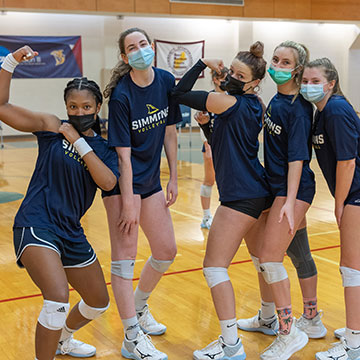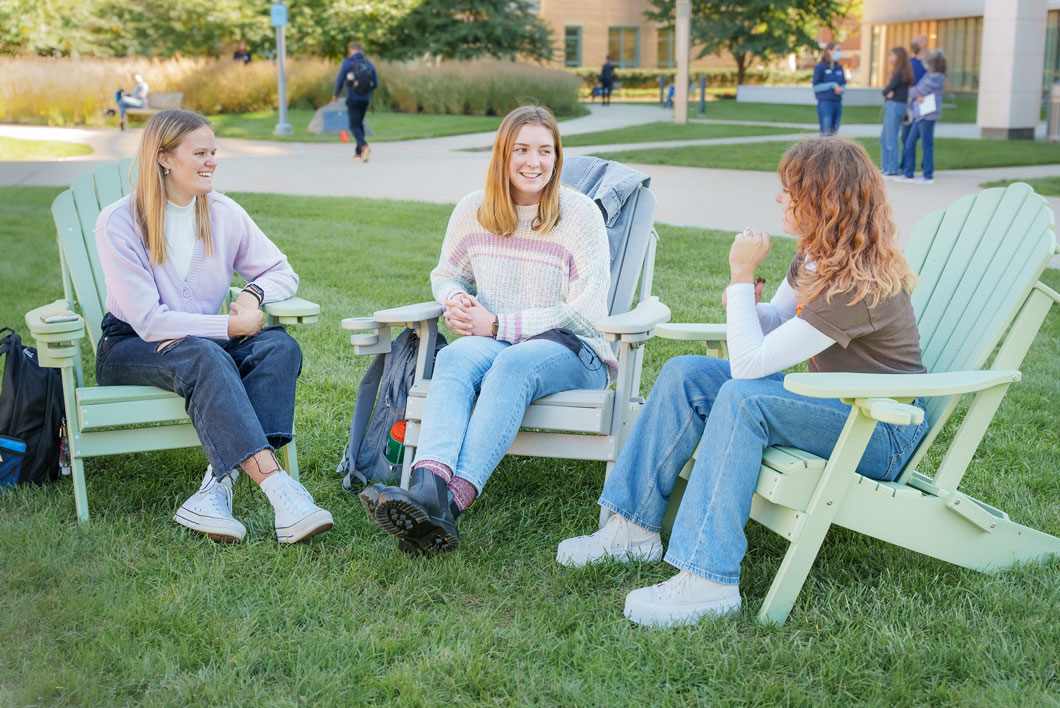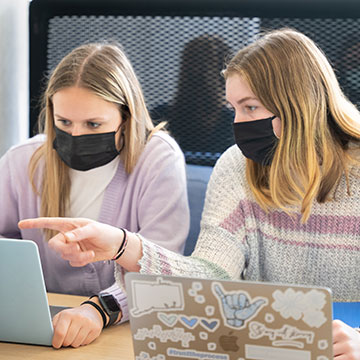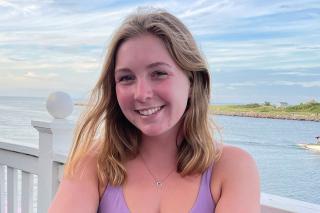What were you looking for during your college search process?

When I was looking at schools, I was trying to decide if I wanted to continue to play volleyball. I had a hard time finding a school that offered both good academics and athletics. The head volleyball coach, Scott Grandpre, approached my mom at a tournament one weekend, and I immediately dismissed it, seeing that it was right in Boston and a women-centered college. Initially, I didn’t like the thought of either.
When it came closer to deciding where to go, I still had no number one school, so I reached out to Coach Grandpre to see if there was still a possible spot on the team for me or if it was possible to visit. I immediately fell in love with the team and the location despite my initial hesitation.
What inspired you to become an exercise science major?
I initially came to Simmons in the 3+3 DPT program, which I thought I wanted to do my whole life. I had the opportunity to work as a Physical Therapy Aide and realized I didn’t like PT as much as I thought I would. Luckily I was a first-year when I realized this and was able to talk to the Pre-Health advisor, and she showed me a lot of options of what I could do without altering my major or course load too much. I decided to stick with the health and exercise science degree because it aligns well with the Pre-PA track, which I’m doing now.
I’m also minoring in nutrition and psychology. I’ve always been interested in these subjects and had extra space in my schedule, so I decided to take some classes I liked. Also, nutrition and psychology will benefit my future career because they are all intertwined in healthcare.
Luckily for me, the exercise science program at Simmons has (in my opinion) the BEST faculty ever.
Do you have a favorite course you've taken so far?
“Sports Nutrition” — I found the information super interesting, and the course was engaging. We learned how to recommend types and amounts of foods to athletes to give them proper nutrition at different points of their year. For example, we learned the number of grams per kg of body weight of carbohydrates someone needs to eat four hours versus one hour before a game. We also learned about the importance of eating protein and carbohydrates after you finish exercising. There is a window of time where your body is very good at absorbing those nutrients.
Another class that I enjoyed was my learning community but specifically the psychology aspect of it. The class was centered around memory and lying, so we learned how memories are formed and why eyewitness accounts aren’t always accurate.
Is there anything unexpected you've learned from your classes?
Something that I’ve taken away from my classes is how amazing the human body is. The more I learn about the different aspects and systems, the more appreciation I have for it. There is so much going on all the time that you have no control or awareness of — I think this is so amazing and beautiful. In anatomy and even my psychology classes, it's incredible to see how much our bodies do for us without us having to control any of it.

Do you have any tips for prospective students considering an exercise science degree?
If you want to be successful, you have to:
- Really love what you’re studying.
- Put the work in.
During my first year, I struggled a little bit with the adjustment from the workload from high school compared to college. There is so much more information that you’re responsible for, which means I had to find a new way to learn and retain the information.
In respect to my minors, my advice would be to minor in something that you enjoy and avoid taking classes you don’t like just to get a minor. Minors are a great way to have a well-rounded education but don’t force yourself to take classes you hate just to complete minor requirements.
What about your department's faculty stands out to you?
Luckily for me, the exercise science program at Simmons has (in my opinion) the BEST faculty ever. From my experience, they are always looking out for the students in their program, trying their best to learn everyone's names and make sure that you succeed in your classes.
Recently I had a Zoom meeting with Randi Lite to introduce myself since I’m taking BIO 332 with her this year. She helped me realize that I needed a new advisor since I wasn’t in the DPT program anymore and told me exactly who to email. So I reached out to Mike Welch, one of the exercise science faculty members, to ask if he would be my advisor. I knew Mike because he used to be one of the athletic trainers in the sports center, and I would see him frequently since I play volleyball. He quickly responded and said that he would absolutely be my advisor. Even though I’ve only taken one class with Randi and two classes with Mike, I’m looking forward to working with them in the future as I continue with my degree.
How is Simmons preparing you to become an everyday leader?

Simmons has given me such a great opportunity to better my leadership skills in class and extracurricular activities. I think it’s great that the class sizes are smaller so that everyone feels like they can speak up and talk directly to their professor. This allows you to ask questions if you need clarification and makes you feel comfortable talking in front of a smaller group. I also like the smaller class sizes because you get to form a relationship with your professor and your classmates.
Outside of class, Simmons offers so many clubs and other activities that you can get involved in and take on a leadership role. For over a year now, I’ve worked as a Simmons Academic Mentor (SAM), which allows me to connect with first-year students and answer their questions about advising, classes, professors, college life, and everything in between. I think the SAMs are a great way to connect with older students and also helps me continue to grow my leadership skills. This year I also was given the opportunity to be a learning assistant in CHEM 111. This position also allows me to interact with younger students and help them learn the material in the class.

